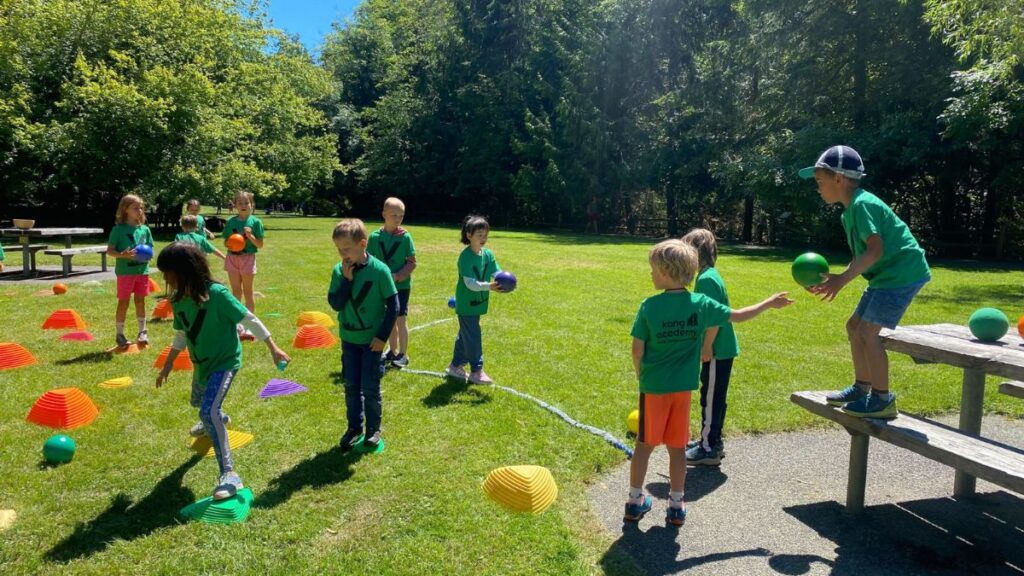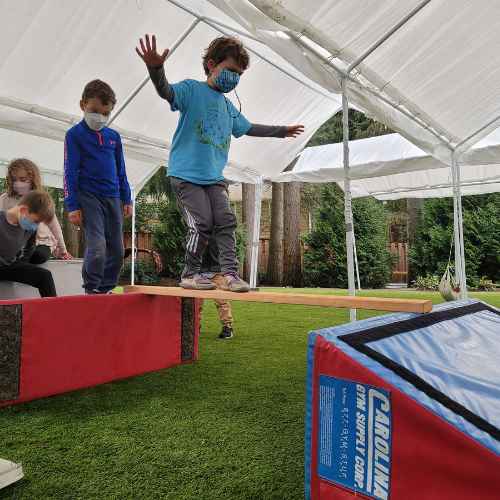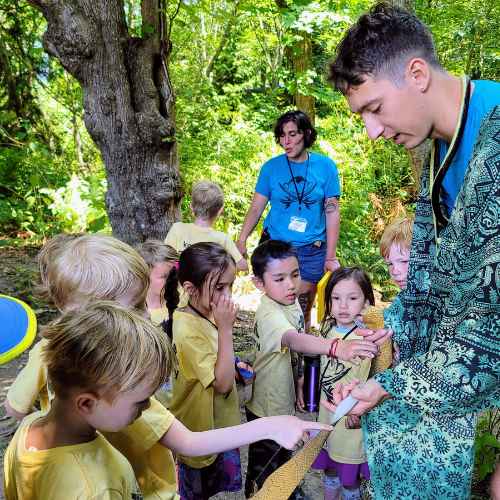
Children aren’t born with the ability to overcome challenges. The resilience and perseverance develops in them as they learn and grow from experiences. When adults spend too much energy coddling their children, unfortunately this won’t help them become stronger. The truth is, in many cases they’ll only grow to be more dependent on you which is often the opposite of what you’re trying to achieve.
For children to learn how to do hard things, your support is the most important. But, it’s followed closely by your belief in them that they can learn how to do whatever the task is. These two combined forces: your positive beliefs along with practice are the backbone of how kids learn how to do hard things. And, while it’s never easy to watch your kid’s struggle, the rewards at the end are priceless.
Why Teaching Kids To Do Hard Things When They Are Young Is Important
Teaching kids to tackle tough tasks from a young age is so important because it helps them grow into resilient, confident individuals. When children are encouraged to face challenges, they learn that persistence and effort really do pay off, which nurtures a positive attitude towards life’s ups and downs.
Building Resilience in Kids
While we often think of childhood as the most carefree time of life, it’s important to remember that it doesn’t always prepare kids for the emotional hurts and traumas they might face. In our complex and uncertain world, children have to grow up dealing with many challenges. Building resilience from a young age is the best way to help them face the future with strength and confidence.
Understanding Resilience
Resilience is the ability to face and adapt to stressful events and difficulties. While building resilience can help children manage their emotions better, it won’t make them completely immune to distress. It will only allow them to process their feelings of anxiety, stress, and uncertainty in a healthy way. This will help them deal with difficult situations better.
Activities to Foster Resilience
Building resilience in children can be a rewarding and fun process. Here are some approachable and heartfelt ways to help them develop this vital trait:
1. Promote a growth mindset
Teach them that effort and persistence are key to success. Celebrate their hard work and determination, rather than just the end result, to help them understand the value of perseverance.
2. Model resilience
You can share your own experiences with overcoming challenges. Let them see how you handle setbacks, and talk about the steps you take to bounce back. Your example can be a powerful lesson.
3. Create a supportive environment
Make sure to let them know it’s okay to make mistakes and take risks. A safe and nurturing environment encourages them to try new things without fear of harsh criticism.
4. Encourage outdoor play and physical activity
Physical challenges like climbing, biking, or playing team sports can teach them to push their limits and cope with failure. It is also a great way to burn off energy and have fun.
5. Read stories of resilience
Share books and stories about characters who overcome challenges through perseverance. Discuss these stories and the lessons they teach, inspiring your child with examples of courage and determination.
Encouraging Perseverance
Similar to resilience, teaching kids perseverance side by side is necessary to prepare them for dealing with hard things.
The Importance of Perseverance As Kids Learn to do Hard Things
Children often struggle to persevere through hard work when they get overwhelmed. Constant school work and pressure to perform better might make them anxious. They might end up completely shutting down if it becomes too much to deal with. This is why teaching skills of perseverance is important to curb these feelings.
Practical Ways to Teach Perseverance
Teaching perseverance to children can be both practical and enjoyable, and the best way to develop this is by doing the following:
1. Encourage effort, not just results
Praise your child for their hard work and effort, even if they don’t achieve the desired outcome. Let them know that trying their best is what truly matters.
2. Teach patience
Help your child understand that some things take time to achieve. Practice patience together by working on activities that require sustained effort, like gardening, building models, or cooking.
3. Celebrate progress
Recognize and celebrate your child’s progress, no matter how small. Acknowledging their efforts and improvements keeps them motivated and reinforces the value of perseverance.
4. Provide opportunities for practice
Give your child plenty of chances to practice perseverance in various contexts, whether it’s in academics, hobbies, or everyday tasks. The more they practice, the more naturally it will come to them.
5. Stay positive
Encourage a positive attitude towards challenges. Teach your child to see difficulties as opportunities to learn and grow, rather than as insurmountable obstacles. Your optimism will help them develop a resilient mindset.
Developing Problem-solving Skills
Children often see the smallest things as big concerns, and knowing how to deal with these concerns is necessary. Without this essential skill, they will only choose to avoid problems and get discouraged by challenges easily.
Problem-solving Strategies
Here are three strategies parents can use:
1. Role Play Scenarios
Engage your child in role-playing activities where they can practice solving problems in a safe and fun environment. Create scenarios that they might encounter in real life, such as resolving a conflict with a friend or figuring out how to share toys. Make sure to provide guidance and encouragement, reinforcing the idea that it’s okay to make mistakes and learn from them.
2. Skill Teaching
Here are some skills you can teach your child based on their age:
For 3-5 year olds: Focus on helping them recognize and name their emotions. You can use simple language and visual aids like emotion charts. Encourage them to express their feelings and reassure them that all emotions are okay.
For 5-7 year olds: Consider their thoughts and enable them to see things from different perspectives. Ask questions like, “How do you think your friend feels?” or “What could we do to make things better?”
For 7-9 year olds: Challenge their critical thinking skills by asking open-ended questions like, “What might happen if we try this?” or “Can you think of another way to solve this?”
3. Encourage Independence
Allow your child to try solving problems on their own, even if it means they might struggle a bit. Encourage them to take responsibility for their actions and decisions, reinforcing the idea that they are capable and competent.
Fun Problem-solving Games and Activities
Engaging children in fun problem-solving games and activities is a fantastic way to develop their critical thinking skills while keeping them entertained. Here are some enjoyable activities that can boost their problem-solving abilities:
- Puzzle Solving
- Scavenger Hunts
- Board Games and Card Games
- Building and Construction Games
- Escape Rooms and Mystery Games
- Role-Playing Games
- Art and Creativity Challenges
- Math and Word Games
- Outdoor Exploration
Boosting Self-confidence
Building self-confidence is just as important as any other skill because your child will never be able to put their abilities into practice if they don’t have the confidence to do so. Your job as a parent is to encourage this confidence in them through your support and love.
Why Self-confidence Matters
As children learn new skills, they build confidence in themselves. As they grow, this self-confidence helps them trust their instincts and use their abilities, even when there’s a risk of failure. In fact, experiencing failure teaches them not to be discouraged by setbacks but to learn from their mistakes and keep going.
Confidence-building Activities
Here are some simple activities you can let your child handle to build their confidence:
1. Packing for a Trip
Letting your child pack for a trip is a wonderful way to build their self-confidence. Give them a list of essentials and let them take charge. They’ll feel proud of their contribution and gain a sense of independence, knowing they can handle this responsibility.
2. Making Snacks
Letting your child prepare and serve a snack can be a simple yet effective confidence booster. They’ll take pride in their ability to make something for others and enjoy the positive feedback from family members. It’s a small task that can have a big impact on their self-esteem.
3. Doing Chores
Assigning your child regular chores helps them develop a sense of responsibility and competence. Whether it’s setting the table, watering plants, or tidying their room, completing these tasks gives them a feeling of achievement and confidence in their ability to contribute to the household.
Effective Goal-setting Setting for Hard Things for Kids
Helping kids set goals, especially for challenging tasks, is a crucial part of building their confidence and resilience. You should encourage them to take on challenges, while reminding them that it’s okay to struggle and that perseverance is key.
Setting Achievable Goals and Teaching Kids to Tackle Hard Things
When teaching kids to tackle hard things, it’s important to set goals that are both challenging and attainable. Guide them in identifying realistic targets that push their limits but are still within reach. Teach them to approach difficult tasks with a positive mindset, breaking them into smaller, actionable steps. Celebrate their efforts, not just the outcomes, and remind them that every small step forward is a victory.
Tracking and Celebrating Goals
Help your child keep a journal or use a chart to track their progress toward their goals. This visual reminder can be very motivating. Celebrate each milestone, no matter how small, to reinforce their hard work and dedication. This not only boosts their confidence but also helps them appreciate the journey and the effort they put in.
Overcoming Obstacles for Kids to Learn to Handle Hard Things
Helping kids learn to overcome obstacles is important as it teaches them that challenges are a natural part of life and that facing them head-on can lead to personal growth and achievement.
Common Challenges for Kids
Kids often face a variety of challenges, from academic difficulties to social pressures. They might struggle with time management, experience anxiety over tests, or have conflicts with friends. These obstacles can be daunting and sometimes make them feel overwhelmed or discouraged.
Strategies for Overcoming Obstacles
1. Break It Down
Teach kids to break large tasks into smaller, more manageable ones. This makes the challenge seem less overwhelming and allows them to focus on one step at a time.
2. Positive Mindset
Encourage a positive attitude by reminding them that setbacks are a normal part of learning. Help them see mistakes as opportunities to improve and grow.
3. Seek Help
Let them know it’s okay to ask for help. Whether it’s from a teacher, parent, or friend, seeking support can provide new perspectives and solutions.
4. Stay Organized
Help them develop organizational skills, like keeping a planner or setting reminders. Staying organized can reduce stress and make it easier to tackle tasks.
5. Celebrate Progress
Acknowledge and celebrate their efforts and achievements, no matter how small. This reinforces their hard work and builds confidence in their ability to overcome challenges.
It’s important to understand that we don’t help our children by trying to make their lives completely painless. Parents should instead focus on teaching children how to confront daily challenges and adversity. This helps them develop character and develop self-confidence. It’s through these experiences that they discover their strengths, build emotional resilience, and ultimately, learn how to face the challenges that life will throw at them.
If you’re in the Seattle metro, we offer summer camps and after school programs designed to empower kids and infuse their sense of independence. Contact us today to learn more.
GET Access to the ULTIMATE PLAY DATE PACKAGE (Value: $49) for FREE!


7-Day Crystal Shard Adventure
Unleash your child’s potential with our 7-day crystal shard movement adventure!




